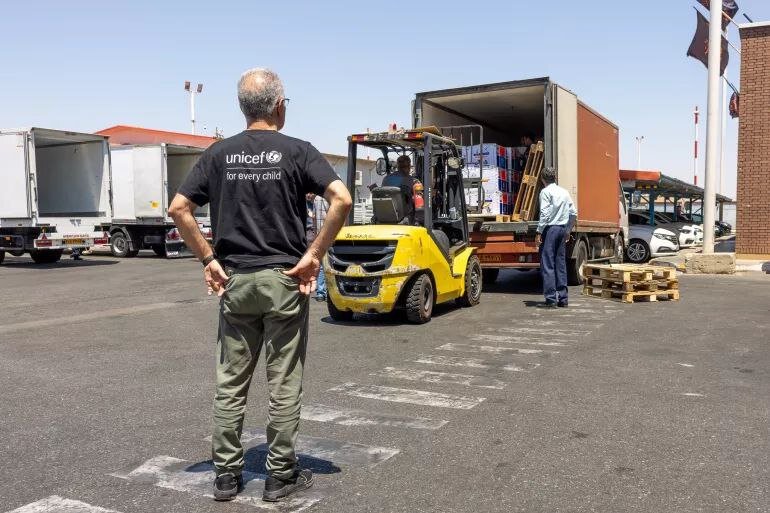UNICEF supplies Iran with rabies, pentavalent, and rotavirus vaccines

TEHRAN – The United Nations Children’s Fund (UNICEF) has procured large consignments of rabies, pentavalent, and rotavirus vaccines to immunize children against life-threatening diseases.
The vaccines were procured at the request of the Ministry of Health and Medical Education (MoHME).
Over 1 million doses of rotavirus vaccine were delivered on August 21 and 23, with earlier supplies in May. This vaccine protects children from severe diarrhea, a major cause of child illness.
On August 23, 15,000 doses of rabies vaccine arrived, with another 74,400 expected by the end of September. Rabies is a deadly disease spread through the bite of infected animals.
More than 255,000 doses of the pentavalent vaccine also arrived on August 23. This single shot protects babies against five dangerous diseases, including diphtheria, Hib, whooping cough, hepatitis B, and tetanus. It’s usually given to babies in their first year, as part of their regular vaccination schedule.
On August 3, 465,000 doses of the Pentavalent vaccine landed in the country.
These deliveries, following the 12-day conflict in June, highlight UNICEF’s close cooperation with the Iranian government and global partners like the GAVI Alliance. Together, they aim to ensure every child in Iran has access to life-saving vaccines, even in times of crisis.
On July 30, the latest batch of Pneumococcal Conjugate Vaccine (PCV) —200,250 vials—arrived in Iran. This followed an earlier shipment in April that included PCV and the Rotavirus vaccine.
These efforts were made possible with support from the Global Alliance for Vaccines and Immunization (GAVI Alliance), a global organization that helps improve access to vaccines in low- and middle-income countries.
In March 2024, UNICEF supported the delivery of 564,000 doses of the Pneumococcal Conjugate Vaccine (PCV) for the prevention of pneumococcal-related infections and deaths among children in Iran.
The consignment was the first shipment of PCV to the country, using Iran’s financial resources left over from the procurement of COVID-19 vaccines, and delivered in collaboration with the Ministry of Health and Medical Education of the Islamic Republic of Iran, through UNICEF procurement services. The shipment arrived from India and landed at Tehran’s Imam Khomeini International Airport on March 17.
The vaccine was added to Iran’s national immunization schedule in 2024. PCV protects young children from dangerous illnesses like pneumonia, meningitis, and blood infections—diseases caused by the Streptococcus pneumoniae bacteria. Pneumonia remains one of the top killers of children under five worldwide, so getting this vaccine to infants is a life-saving step.
UNICEF is also working hard to make sure these vaccines stay effective from the moment they arrive in the country to when they’re given to each child. That means supporting cold chain systems—like walk-in refrigerators and specially-equipped delivery trucks—to keep vaccines at the right temperature. UNICEF also trains health workers and provides technical support to make sure vaccines are handled safely and according to international standards.
With every delivery, UNICEF is helping make sure every child in Iran has a fair chance at a healthy start in life.
National immunization program
In May, the health ministry started distributing domestically made pentavalent vaccines across the country.
“So far, about 800,000 units of the vaccine have been developed, and this number is expected to reach 1.2 million units in the next 2 to 3 days,” IRNA quoted Mehdi Pir-salehi, head of the Food and Drug Administration (FDA), as saying on May 5.
The pentavalent vaccine was integrated into the national vaccination programme in November 2014. According to the national vaccination program, each child must receive the pentavalent vaccine 3 times at intervals of 2 months. The first is usually at the end of the second month of life.
The vaccination program to combat pneumococcal and rotavirus kicked off in the country in February 2024 after being missed from the immunization schedule for a decade.
According to the deputy health minister, Alireza Raeisi, children can get free pneumococcal and rotavirus vaccinations in all medical centers across the country.
Pneumococcal vaccine can be injected when babies are 2, 4, and 12 months old; babies can get three doses of the rotavirus vaccine at the 2nd, 4th, and 6th months of life. The vaccine is administered by putting drops in the child’s mouth.
MT/MG
Leave a Comment